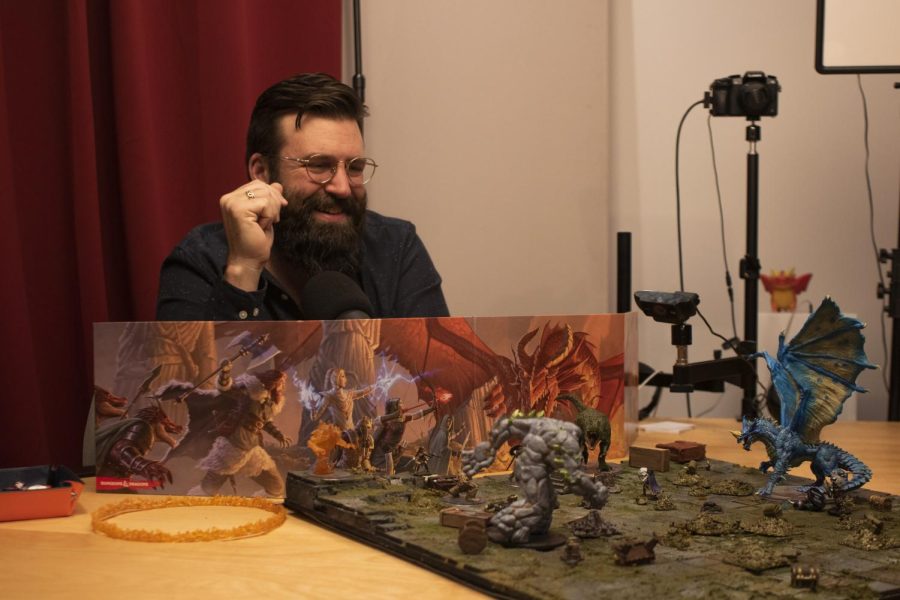Delving into the Dungeon
Bay Area gamers open the doors to a new generation of players.
Devon Chulick, game master for “Total Party Chill,” behind his DM screen recounting the party’s previous battle on November 29th, 2022. One player was polymorphed into a dinosaur while another was downed fighting in a dragon’s lair. (Oliver Michelsen / Xpress Magazine)
It was in a booth at a Round Table Pizza where Devon Chulick discovered his love for roleplaying games. His mother had purchased him a “choose your own adventure” book. Chulick — a toddler at the time — was too young to read it, so his mother read to him while he rolled dice to determine the different possible outcomes. He wasn’t the slightest bit concerned with the pizza that had arrived at the table — only with figuring out what would happen next in his story.
He was hooked.
Today, Chulick is a professional Dungeons and Dragons (D&D) game master, liveplay host and cofounder of Start Playing, a website dedicated to connecting players of tabletop games like D&D seeking community. He is also one member of a larger community of players in the Bay Area that dedicate their time to getting together with friends and strangers alike, using their imagination to create entire worlds through collaborative storytelling.
Dungeons and Dragons is tabletop roleplaying game originally developed in the early 1970s by game designers Ernest Gary Gygax and David Arneson. The game has changed a lot in the span of 50 years, but its premise remains the same. Players create their own customizable characters, ranging from classic Merlin-esque human wizards to lute-playing goblin bards, and go on adventures crafted by their group’s game master.
D&D doesn’t denote the same connotations it did early on in its existence. With a new blockbuster Dungeons and Dragons movie set to release in March of 2023 starring Chris Pine, Hugh Grant and Michelle Rodriguez, what was once viewed by many as a game for nerds has transformed in the public consciousness into a fun and meaningful pass time.
Though people have been playing D&D for nearly half a century, the game has seen its biggest rise in popularity over the past two years. According to annual earning reports from Hasbro, Wizards of the Coast — the main seller of D&D products — experienced an unprecedented 42% revenue increase in 2021 alone. This is even higher than the previous year’s report, which saw a 33% increase in revenue.
This is due in large part to the Covid-19 pandemic and subsequent lockdowns of 2020 and 2021. Many looking for something new and fun to do in the midst of an international pandemic turned to more escapist pastimes like D&D.
Chulick recognized this early on, which led him to create “Start Playing” with his cofounder Nate Tucker in 2020. The platform allows game masters to set prices for their services, which players can then choose to pay for to play an online game of D&D.
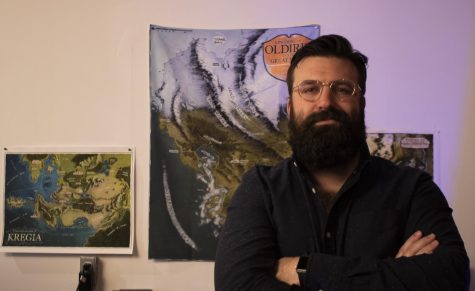
Two years since the platform’s inception, Chulick said that game masters on the website have made a combined $5 million — and over $100,000 in November alone.
“When you’re in your own space, you’re in your comfort zone,” Chulick said, explaining some of the benefits of the platform. “We’re seeing a lot of people feel really comfortable like, ‘Hey, I don’t have a lot of time. I have three hours every Thursday. I can jump online, I can play my game, I can have the fun I really want. I don’t have to commute…’ And that’s cool. That’s like a whole [new] form of D&D.”
Implied in its category of “tabletop roleplaying game,” D&D has traditionally been played in-person, in a small group around a table. However in a more online world than 1974 many players have only ever played online.
Rue Diaz, a 22-year-old from Modesto, has lived in San Francisco for four years and played D&D exclusively online until recently. Diaz became interested in D&D in the midst of the pandemic, after seeing a popular online show called “Fantasy High” where improv comedians from College Dropout’s “Dimension 20” play live.
Tabletop liveplay shows are a more recent phenomenon, popularized by titles like “Critical Role,” where a group episodically releases their D&D sessions while telling a cohesive story. Many shows, like Chulick’s “Total Party Chill,” go as far as to stream their sessions live for their audience to watch on Twitch or YouTube.
“I saw how fucking fun that shit was, so me and one of my housemates were just in our living room by ourselves… and we just went on a website and were like ‘oh lets make some little characters,’” Diaz recalled. “But I was like, ‘Let me actually try this character. Like hold on, let me search.’”
Diaz soon found a group online through the Start Playing service, and began their first D&D campaign as an Aasimar moon elf with a missing brother. Since then they haven’t stopped playing — though they did have to find a new group after their game master killed everyone’s characters. Diaz laughed recalling that first campaign, saying they prefer to pretend the ending didn’t happen and that their character got married and lived happily ever after.
Despite the mixed results of their first online experience, Diaz has enjoyed playing tabletop roleplaying games online with others for almost two years now. With a new group, Diaz is able to play a game every other week from the comfort of their knick-knack-adorned room.
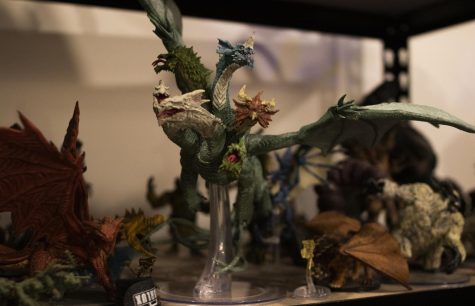
Playing online mitigates a lot of the issues that come with organizing an in-person session. Conflicting schedules, long commutes and lack of a location are just some of the different obstacles that often deter a group from getting together for a night of D&D. But for some, the experience of sitting around a physical table simply cannot be replaced.
Prior to the pandemic, multiple Bay Area stores consistently hosted in-person events, inviting players to come in and play tabletop roleplaying games, such as D&D. Though many had to cease over the course of the pandemic for health and safety reasons, some are getting back into consistently hosting these and similar events.
Gamescape SF, a games store located on Divisadero Street, hosts almost-daily tabletop gaming events. One of which is titled the Adventurer’s League, where new and experienced players are invited to join in on a night of D&D.
At the front of the Dogpatch Games store, their windows are adorned with their logo — an aptly eye-patched dog. The front of the store is filled with a plethora of different board games, books and game accessories.
But beyond a small doorway are the store’s community spaces. The main room, which is filled with tables and shelves packed full of card and board games, is referred to as “the Tavern.” It is open to community members most days of the week. Just beyond that is the store’s designated Dungeons and Dragons room.
Small red dice in prop glass vials sit neatly on a shelf, representing the game’s healing potions, while a multitude of different colored dice are piled in small trays at the head of the table in the center of the room.
Andrew Beahm is a manager at Dogpatch Games, and has been playing tabletop games like D&D for twenty years. He helps to organize events in the Tavern and the D&D room, many of which are specifically geared towards beginners.
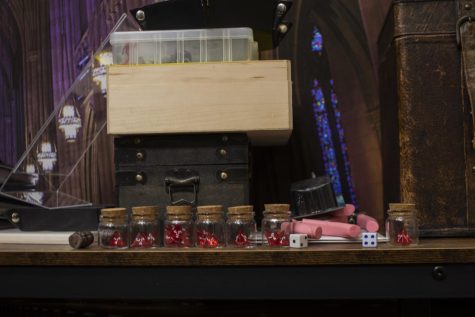
“People are spending less time physically with friends than ever, to an astonishing degree. And I think that we really want to preserve that warm camaraderie of the game table,” Leahm said. “Nothing really beats the convenience of playing online, but I think the quality of experience is better in person. And with the pandemic, we’ve tried to make it as safe as possible to do that.”
In addition to these physical community rooms, Dogpatch Games also maintains a Discord server, where members can organize their own D&D games utilizing the store’s spaces.
Chulick is an outspoken supporter of any type of play: online, in-person, an open-to-all community or private. But the experience of playing in the Total Party Chill studio is just a little different than the average game space at stores like Dogpatch Games.
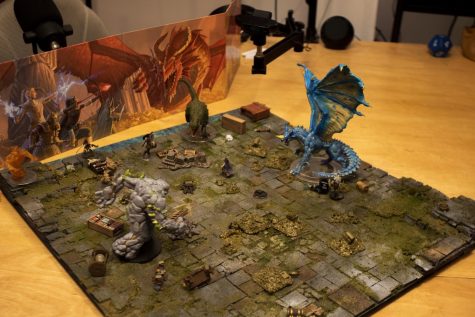
Every Sunday, Chulick is greeted at the Total Party Chill studio — located locally in the Mission — by shelves upon shelves of custom painted miniatures. The small meticulously detailed creatures range from undead dragons to tentacled scifi abominations. Chulick prepares as much as he can throughout the week, coming up with answers for any questions his players may have about their quest, or ironing out the lore of the world he specially designed.
Unlike many game masters, Chulick has to worry about the enjoyment of an audience at home as well as the group of players in front of him. He doesn’t seem to let that get to his head though.
“I feel everyone deals with imposter syndrome, but the main thing is if your friends are coming back… or people are coming back because they want to play again, that’s the best insight you can get.”

Oliver Michelsen is a fourth-year journalism student with a minor in history. Born in Virginia, he moved around frequently throughout his childhood, living...


